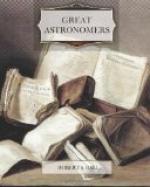In his earlier years, Lord Rosse himself used to be a diligent observer of the heavenly bodies with the great telescope which was completed in the year 1845. But I think that those who knew Lord Rosse well, will agree that it was more the mechanical processes incidental to the making of the telescope which engaged his interest than the actual observations with the telescope when it was completed. Indeed one who was well acquainted with him believed Lord Rosse’s special interest in the great telescope ceased when the last nail had been driven into it. But the telescope was never allowed to lie idle, for Lord Rosse always had associated with him some ardent young astronomer, whose delight it was to employ to the uttermost the advantages of his position in exploring the wonders of the sky. Among those who were in this capacity in the early days of the great telescope, I may mention my esteemed friend Dr. Johnston Stoney.
Such was the renown of Lord Rosse himself, brought about by his consummate mechanical genius and his astronomical discoveries, and such the interest which gathered around the marvellous workshops at Birr castle, wherein his monumental exhibitions of optical skill were constructed, that visitors thronged to see him from all parts of the world. His home at Parsonstown became one of the most remarkable scientific centres in Great Britain; thither assembled from time to time all the leading men of science in the country, as well as many illustrious foreigners. For many years Lord Rosse filled with marked distinction the exalted position of President of the Royal Society, and his advice and experience in practical mechanical matters were always at the disposal of those who sought his assistance. Personally and socially Lord Rosse endeared himself to all with whom he came in contact. I remember one of the attendants telling me that on one occasion he had the misfortune to let fall and break one of the small mirrors on which Lord Rosse had himself expended many hours of hard personal labour. The only remark of his lordship was that “accidents will happen.”
The latter years of his life Lord Rosse passed in comparative seclusion; he occasionally went to London for a brief sojourn during the season, and he occasionally went for a cruise in his yacht; but the greater part of the year he spent at Birr Castle, devoting himself largely to the study of political and social questions, and rarely going outside the walls of his demesne, except to church on Sunday mornings. He died on October 31, 1867.
He was succeeded by his eldest son, the present Earl of Rosse, who has inherited his father’s scientific abilities, and done much notable work with the great telescope.




